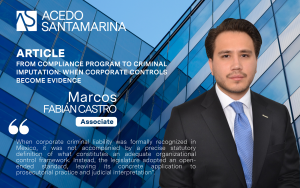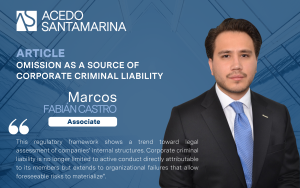On July 18th, 2024, the mayor of Mexico City published in the Official Gazette the “Decree by which Article 65 of the Solid Waste Law of the Federal District is amended; Articles 221, 222, 223, and 224 of Chapter VI of Title Seven of the Environmental Law for the Protection of the Earth in Mexico City are repealed, and the Environmental Liability Law of Mexico City is issued” (the “Environmental Liability Law“).
The Environmental Liability Law aims to regulate the environmental liability regime provided in Articles 13 Section A Paragraph 1 and 16 Section A Paragraph 7 of the Political Constitution of Mexico City for guaranteeing the human right to a healthy environment for the development and well-being of people, and the fundamental right to determine the responsibility arising from environmental damage.
Article 73 Section XXIX-G of the Political Constitution of the United Mexican States establishes that the Federal Congress has the authority to enact laws regulating the involvement of the Federal Government, the governments of the federal entities, and the Municipalities of the States and the territorial demarcations of Mexico City, in matters of environmental protection and the preservation and restoration of ecological balance, within the scope of their respective responsibilities’.
In this regard, the General Law of Ecological Balance and Environmental Protection stipulates that the Government of Mexico City is responsible for formulating and conducting environmental policy based on various principles, including the obligation of authorities and individuals to protect ecological balance.
Additionally, Article 1 of the Federal Environmental Liability Law establishes that its purpose is to regulate environmental liability arising from environmental damage, as well as the repair and compensation of such damage when enforceable, through the federal judicial processes provided by Article 17 of the Constitution, alternative dispute resolution mechanisms, administrative procedures, and proceedings related to crimes against the environment and environmental management. Article 4 of the same federal law establishes that the action and procedure to enforce environmental liability can be exercised and substantiated independently of the corresponding administrative, civil, and criminal liabilities and procedures.
In the case of the Environmental Liability Law, Article 10 establishes that individuals or legal entities are responsible for actions or omissions that have directly or indirectly caused adverse and measurable loss, change, deterioration, impairment, and/or modification of habitats, ecosystems, natural elements and resources, their chemical, physical, and/or biological conditions, the interactions between them, as well as the environmental services they provide. As a result, such individuals are obligated to repair the damage.
Furthermore, the Environmental Liability Law excludes matters related to environmental and urban impacts in protected areas, areas of environmental value, and conservation land areas intervened by the Environmental Secretariat of the Government of Mexico City (“SEDEMA“).
The Environmental Liability Law regulates a regime of both, subjective and objective liability, and provides the following measures of reparation of the damage: (i) compensation, (ii) indemnification, (iii) satisfaction, (iv) guarantees of non-repetition in their individual, collective, moral, and symbolic dimensions, and (v) attention to affected individuals and instruments to support the repair, which must be carried out in the location where the damage occurred.
Additionally, it contemplates the possibility that SEDEMA may repair damages on a subsidiary basis due to urgency or importance when third parties cause harm to the natural environment. SEDEMA must then claim restitution of the economic resources disbursed from the responsible party within two years from the date of the last payment made. These resources will be allocated to the “Subaccount for Damage Repair and Environmental Management of the Public Environmental Fund,” whose purpose is to concentrate the funds obtained from the payment of damages caused to natural elements of the environment, as a result of judgements.
The economic penalties contemplated in the Environmental Liability Law are: (i) for individuals, from 300 to 50,000 UMAs, and (ii) for legal entities, from 1,000 to 600,000 UMAs. The resources obtained from these penalties should be used to finance the repair of damages caused to natural elements of the environment in cases of urgency or importance and to cover the costs of various expert reports required by the public prosecutor or judicial authorities.
The judicial authority will determine the economic penalty considering: (i) the severity of the damage caused, (ii) the economic capacity of the person responsible, (iii) intent or negligence, and (iv) ensuring that it is sufficient to guarantee non-repetition. If the responsible party demonstrates having paid an administrative fine for violations of environmental regulations resulting from the conduct that caused environmental liability, the judge may consider this payment.
On this last point, it is worth noting that Article 3 of the Organic Law of the Administrative Justice Tribunal of Mexico City establishes that the Administrative Justice Tribunal of Mexico City is competent to hear cases brought against actions taken by the Public Administration of Mexico City and/or municipal authorities, which harm individuals or legal entities, as well as actions imposing fines for violations of administrative or local regulations, such as those aimed at environmental protection.
In this regard, the multiplicity of liabilities that a person may incur by violating environmental regulations can create problems in identifying the competent authority (administrative or judicial) to impose the corresponding sanctions, especially considering that the judicial authority of Mexico City is empowered to impose economic sanctions similar to administrative fines.
It is important to note that, under the Environmental Liability Law, those entitled to file legal action for environmental liability, full reparation of damages, and the payment of the corresponding economic sanctions are: (i) individuals residing in Mexico City, (ii) private non-profit Mexican legal entities whose corporate purpose is the protection of the environment in general, and (iii) the Environmental Attorney’s Office of Mexico City.
The legal actions provided for in the Environmental Liability Law will expire twelve years from the date the environmental damage effects become known and must be filed before the Civil Oral Process Courts and Civil Chambers specialized in environmental matters, which will handle the entire process until the judgment is rendered, determining: (i) the obligation to repair the corresponding damage, (ii) the necessary measures and actions to prevent further damage, (iii) the amount of the economic sanction, and (iv) the deadlines for fulfilling obligations.
These judicial bodies will be defined by the Judiciary Council of the Mexico City Judicial Branch, according to the needs and budget available. However, no dead line has been set for their establishment, leaving the governed in a state of uncertainty.
The creation of Civil Oral Process Courts and Civil Chambers specialized in environmental matters could lead to significant delays in the administration of justice in Mexico City, as it would require reallocating material and financial resources for the reorganization of judges, personnel of the new specialized courts, and the corresponding administrative staff, causing delays in the resolution of ongoing cases.
From our perspective, we believe that these resources should first be used to address the current issues facing the Mexico City Judicial Branch, thus easing its workload, especially with the changes being implemented to replace Written Process Courts with Oral Courts. The 2024 Statistical Report of the Judicial Branch[1] shows that, in Civil Courts, from January 2021 to April 2024, 297,674 cases were filed, of which 202,098 were concluded, resulting in a current backlog of 32.1%.
At Acedo Santamarina, S.C., we have a team of lawyers capable of providing comprehensive advice on disputes involving various types of liability, such as administrative, civil, and environmental.
Roberto Altamirano raltamirano@acsan.mx
Marcos Castro mcastro@acsan.mx
Noé Caracheo ncaracheo@acsan.mx
[1] https://www.poderjudicialcdmx.gob.mx/estadistica/informes-estadisticos/




